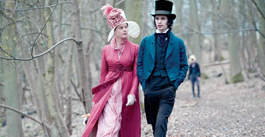home | metro santa cruz index | movies | current reviews | film review

The Keats to Her Heart: John Keats (Ben Whishaw) woos Fanny Brawne (Abbie Cornish) in chaste fashion in 'Bright Star.'
Keats' Star Turn
A carefully made film, 'Bright Star' does rare justice to poetry.
By Stephen Kessler
AT THE END of Jane Campion's new movie, Bright Star, the doomed-love story of John Keats and Fanny Brawne, virtually the entire audience at the show I attended remained in their seats until the closing credits were over. This was no doubt partly because people wanted to see the names of the cast and crew who'd made such a ravishing film; but more than that, they were captivated by the voice of Ben Whishaw, who plays the poet, reading Keats' sublime "Ode to a Nightingale." It's a longish poem, 80 lines, and Whishaw speaks them with exquisite precision and perfect understatement.
Where most actors typically over-emote when reciting poetry, Whishaw (and presumably Campion) understands that the language itself is where the power resides in Keats' poems. The words require no embellishment or melodramatic emphasis. Throughout the movie, when Fanny (Abbie Cornish) and "Mr. Keats" recite parts of his poems, it is always in a nearly flat, sensitive but low-key tone. This emotional restraint, a sense of cool objectivity, is also evident in Campion's direction, so that the movie's style imitates that of the poet.
Campion's engaged detachment, her quiet attention to the sounds (most notably birdsong) and visual textures of the English countryside and to the subtle feelings of her chaste young lovers, casts a spell akin to that of Keats' verse. You want to pay close attention in order to enter into it more deeply and experience its layers of meaning. But mostly you want to listen to its sounds and immerse yourself in its sensuousness. As Keats explains to Fanny when she laments her difficulty in understanding poetry, when diving into a lake one's purpose is not to understand the lake, but "to luxuriate in the sensation of water."
Of course, Keats wrote in the early 19th century, so his language may strike our contemporary ears as a bit obscure, even precious in places, but he remains even today probably the most revered English poet next to Shakespeare. The adoring esteem in which he is held by so many readers (and writers) is surely due in part to his death, of tuberculosis, at 25. He wrote most of his greatest poems--including the five gorgeous Odes: to a Nightingale, to Psyche, on a Grecian Urn, on Melancholy and to Autumn--in the course of a few months when he was 23. (This is the age when most young poets today are working on their MFA degrees.)
Keats' prolific writings, both poetry and letters, reveal the artistic and philosophical sensibility of someone of far greater experience. There is a sweetness and ardor in his voice combined with a wisdom that's hard to fathom in such a young man. So his early death--like, say, James Dean's--is all the more tragic for what it deprives us of in yet-to-be-created art. But unlike Dean, who made just three feature films before crashing his Porsche, Keats left a large, rich legacy of accomplished work that subsequent generations are still relishing.
We love Keats, I think, because he not only left us beautiful poems but lived and died with absolute devotion to the Beautiful--an abstraction that animates his close observation and reinvention of the natural (and human) world. Trained in medicine, he brings a scientist's as well as a painter's eye to what he sees; his ear is naturally musical, his heart is open and his fevered imagination is working overtime.
It's understandable, then, that he would fall for Fanny Brawne, portrayed by Cornish (and Campion) as a smart, bold, witty, willful, high-spirited, burning flame of a girl. (She was 18 when they met.) Neither John nor Fanny, as depicted here, looks like a movie star, but their keen intelligence--and their soul attraction and contained passion--charges their romance with tremendous energy. We are seduced by them as they seduce each other. The fact that their desire is never consummated makes it all the more moving.
Will Bright Star do for Keats what The Postman did for Pablo Neruda--take an already famous poet and make him "popular" at another order of magnitude? Will moviegoing American readers discover there's more to the art of poetry than Billy Collins and Garrison Keillor have to offer? Will filmmakers realize, via Campion's example, that gratuitous violence and special effects are nothing compared to intelligent dialogue and subtle nuances of thought and feeling?
Maybe not. But even Quentin Tarantino, on seeing Campion's movie at Cannes, remarked: "I'm not really into poetry. But the movie made me think about taking a poetry class. One of the best things that can happen from a movie about an author is that you actually want to read their work." I look forward to seeing Tarantino's life of Arthur Rimbaud.
![]() BRIGHT STAR (PG; 127 min.), directed by Jane Campion and starring Ben Whishaw and Abbie Cornish, plays at the Nickelodeon.
BRIGHT STAR (PG; 127 min.), directed by Jane Campion and starring Ben Whishaw and Abbie Cornish, plays at the Nickelodeon.
Send a letter to the editor about this story.
|
|
|
|
|
|